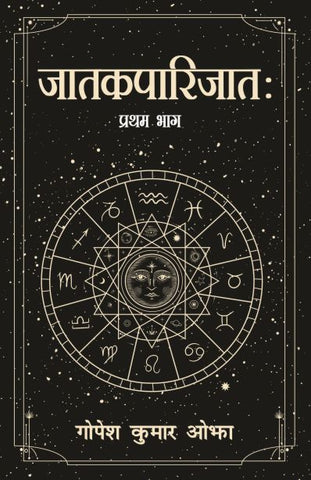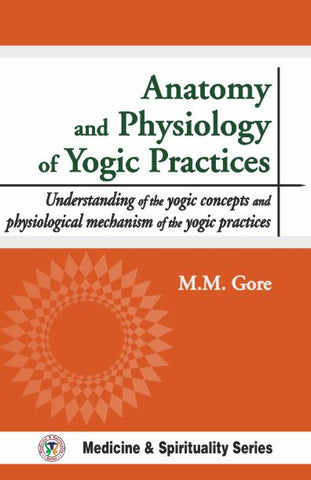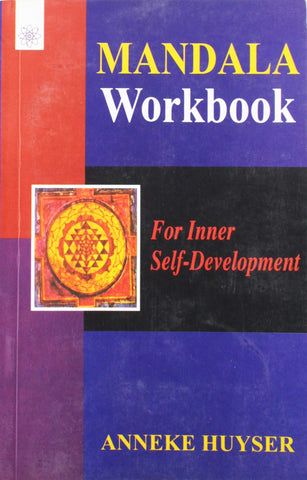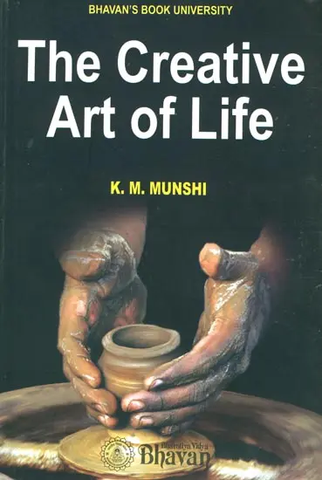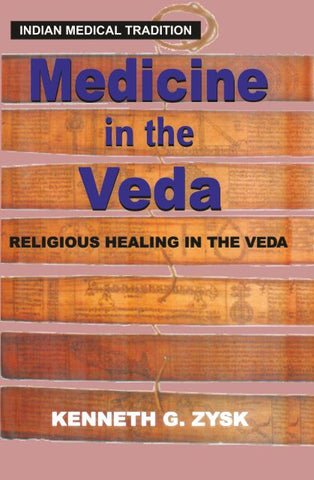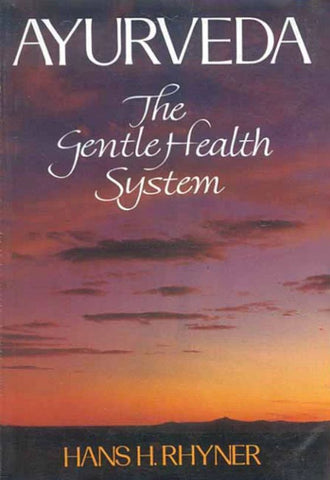Your cart is empty now.
Steven J. Rosen is a freelance writer and the editor of the Journal of Vaisbnava studies. His articles and book have appeared in several languages. He has also authored the Reincarnation East west Dialogues and om Shalom.
People have been eating animals since at least the Ice Age, when, some anthropologists say, our early ancestors abandoned a plant-oriented diet in favor of one containing meat. The custom of meat-eating has continued to the present day, through necessity (as with the Eskimo), habit, or conditioning. Most of all, the practice has continued due to a lack of awareness.
In the last fifty years, however, recognized authorities in health, nutrition and biochemistry have put forward ample evidence that meat-eating is unnecessary for good health and shown that the carnivorous diet is detrimental to human beings. The documentation for this can be freely researched, and there are many good books extolling the virtues of vegetarianism on scientific grounds.
Moreover, meat-eating today involves-for the animal-a long and cruel process of forced imprisonment, biological manipulation, transportation over long distances in crowded and unsanitary conditions, and finally, violent death in the slaughterhouse. After that, the poor animal's remains are eaten. The average person living today in the United States, Canada or Australia consumes over 200 pounds of meat a year, while per capita meat consumption in Western Europe follows close behind. In order to satisfy our demand for meat, more than four billion cattle, calves, sheep, hogs, chickens, ducks and turkeys are slaughtered each year. During a seventy-year lifetime, the meat consumed by an average American or Canadian involves the slaughter of approximately eleven cattle, one calf, three lambs and sheep, twenty-three hogs, forty-five turkeys, 1,100 chickens and some 862 pounds of fish. The amount of pain inflicted upon these creatures (in order to provide meat for our pleasure) is beyond calculation. In addition, animals raised for slaughter consume huge quantities of valuable grains and legumes-food that could otherwise feed millions of starving people around the world. For these and other reasons, many are turning to vegetarianism.
In America alone, there are now some ten million vegetarians. As the meatless diet has grown in popularity over the years, a number of books have been written on the subject. Some of these explore the health reasons behind vegetarianism and point out how a vegetarian diet can help prevent heart attacks, strokes, cancer and other diseases. Some books focus on the ecological, world food and economic aspects of a meat-less diet and show how to enjoy gourmet nutrition without having to spend a lot of money. Others describe how the plant kingdom is the primary source of vital nutrients and how vegetarian diets provide more than enough of the proteins, vitamins and minerals we need each day. Still other books consider many of the ethical, moral and philosophical reasons behind the vegetarian diet. Few works, however, have ever attempted to tackle the difficult subject of vegetarianism and the world religions.
Diet for Transcendence is the first book to do so with depth and clarity. Drawing from a wealth of original religious documents and texts, author Steven Rosen takes us on a fascinating journey back in time to explore the essential and often misunderstood roots of the world's major religious traditions, to discover how vegetarianism was a cherished part of their philosophy and practice. He carefully examines and exposes many of the myths about Buddha, Mohammed and Jesus Christ which have long been used to justify meat-eating on religious grounds. Diet for Transcendence clearly shows that religious compassion was meant to be all-encompassing, directed toward animals as it is toward humans.
In religious discussion, diet-like sex-is a controversial issue. Unlike other books which are either overly emotional or gloss over important matters of doctrine, Diet for Transcendence probes, carefully and logically, the depths of each issue and explores its subject with honesty, clarity and precision. This makes the book easy to ready if also uncomfortable: many of the issues discussed in the following pages are considered sacred and have remained unquestioned by religionists for centuries. Steven Rosen's straightforward examination, based on early manuscripts (as opposed to popular and con-temporary translations) and ancient traditions (as distinct from later forms of religious expression), is likely to undermine many dogmatically accepted beliefs and cause a great deal of debate and controversy. Diet for Transcendence will give food for thought.
The ideas in this book did not originate with the author. Rather, they are the same truths stressed by spiritual teachers throughout history. Religion has always taught, in essence, that reverence for all life is a high spiritual ideal, and that universal brotherhood is the summit of genuine spirituality. This little volume should go a long way toward establishing these goals.
Each day thousands of human beings are born, and each day thou-sands die. At times the world appears to be little more than a vast ocean of birth and death. Animals, too, struggle to remain afloat, and although our activities in life may differ, our end is invariably the same. In terms of mortality, humans and animals are perfect equals.
Human life does of course differ from other forms of life, and this is perhaps best expressed in the human quest for spiritual knowledge. Man's pursuit of God-regardless of the particular tradition-separates him from animals. It is doubtful that an animal will pick up this book, for instance, even for a cursory glance.
Although religions diverge on points of theology and ritual, they unanimously agree on the need for moral codes and ethical principles. Implicit in these codes and principles is the necessity of vegetarianism and com-passion for animals. It is the purpose of this book to show that the world's major religious traditions and their earliest adherents were indeed sympathetic toward the meatless way of life and, in many cases, emphasized vegetarianism.
The issue of vegetarianism and religion is itself overshadowed by the religious hypocrisy which preaches brotherhood and human slaughter in the same breath. While mercy and compassion are qualities espoused by all religionists (and many non-religionists), the world's major religions have done little to promote them. Indeed, we inflict violence and prejudice upon our human neighbors, even as we direct the same toward the animal world. Religion, in fact, seems to instigate violence rather than eliminate it. The examples are numerous: the Crusades, the Inquisition, the perennial fighting in Northern Ireland between Catholics and Protestants, the endless hostility between the Jews and their Muslim neighbors, the Hindu/Muslim killings in postwar India and the bloodshed of the recent past between Buddhists and Hindus in Sri Lanka. Apparently, despite the spiritual mandate for mercy and compassion, many religions exclude not only animals from their scope, but human beings from other religious traditions as well.
Something is amiss. Ideally, religious temperament should run counter to intolerance. The qualities of love, mercy and compassion-the avowed goals of all the major religious traditions-are extolled, and hate, violence and prejudice are condemned. While this is what religions preach in theory, in practice this has rarely been the case. As noted, some of history's bloodiest battles have been fought on religious grounds. While this, in and of itself, does not invalidate organized religion, it makes us question how effectively religious institutions practice what they preach. If those who implement religion-the leaders, philosophers, theologians and avowed adherents-are confused about the treatment of people from other religious traditions, could they then not also be confused about the treatment of animals? Have they perhaps drawn artificial limits on the scope of mercy?
While such limits are evident today, earlier forms of religion had a different story to tell. In fact, the further back we go in religious history, the more respect we find for life in all its forms. Quite naturally, vegetarianism played a part in this respect for all life. Islam, for instance, the youngest of the world's major religions, originated 1,300 years ago and is not a strong supporter of the vegetarian ideal. Christianity, 2,000 years old, offers a bit more evidence for the practicality of the meatless way of life. And Judaism, about 4,000 years old, has a large tradition of vegetarianism. One of the most ancient religions known, Hinduism, is a strong supporter of vegetarian principles. Buddhism and Jainism, while only some 2,500 years old, are essentially Hindu heterodoxies, and so fully share the vegetarian principles upheld by their parent religion, often to a much greater degree.
There are exceptions to this rule. Some modern denominations do indeed promulgate vegetarianism. Seventh-Day Adventists, Quakers and Mormons, for example, have a meatless contingent. And while Sufis are an exception among the Muslims, the Baha'i Faith also endorses vegetarianism (although meat-products are not strictly forbidden). These are exceptions, however, and in general the above rule holds true: the older the religion, the closer to vegetarianism.
Now, to many, the fact that the more ancient religious traditions uphold the vegetarian ideal is proof that vegetarianism is a dated concept, a primitive ideal maintained by superstition or ignorance. To others, the antiquity of vegetarianism stands as a major indication of its primacy in religious thought, before the purity of faith and doctrine was subjected to later revisions, interpretations, or accommodations.
The earliest forms of religious expression fully accept vegetarianism-if not always in practice then at least in scriptural principle. Scripture is here defined as those literary works on which a religion was originally founded, as opposed to later interpretive writings. Any explanation of scriptural teaching-including my own-is in one sense "interpretive." However, since scriptures are held sacred by their respective followers, they should be understood as they were originally intended. This book therefore endeavors to remain as close to original intent as possible by referring to primary sources and literal translations. One may compare and verify, for example, all Bible passages throughout this work by referring to Reuben Alcalay's Complete Hebrew-English Diction for the Old Testament, and Nestle's Interlinear Greek-English New Testament.
Of course, most people do not read their scriptures this way. The tendency is for believers to accept whatever edition or translation of original scripture their church happens to favor at any particular time. And most such popular editions are not translated rigorously or to understand the original meaning of the texts. The philosophical and theological problem with this, however, is considerable. The value of unaltered scripture is analogous to that of a computer instruction manual. Such a complicated apparatus as a computer needs an instruction booklet for proper operation. In the complex universe we inhabit, scriptures act like instruction manuals, guiding us through the intricacies of universal law and function. Further, where a man-made instruction manual may be imperfect and subject to revision, God's law books, by definition, are absolute and eternal, with few differences according to time, place and circumstance. Therefore, if it can be shown that one of the original intents of the world's major religious scriptures was to encourage a meatless diet, then this book contends that any person who even nominally claims to adhere to a particular faith cannot morally justify eating meat.
Contents and Sample Pages

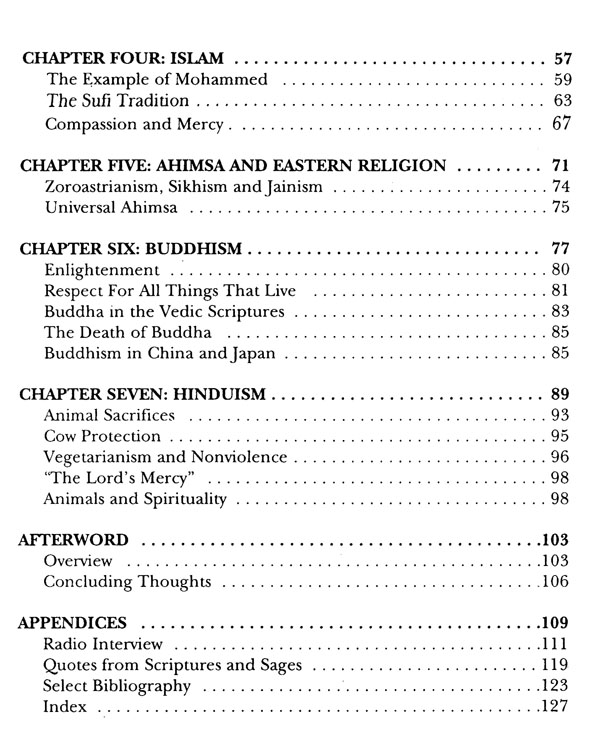
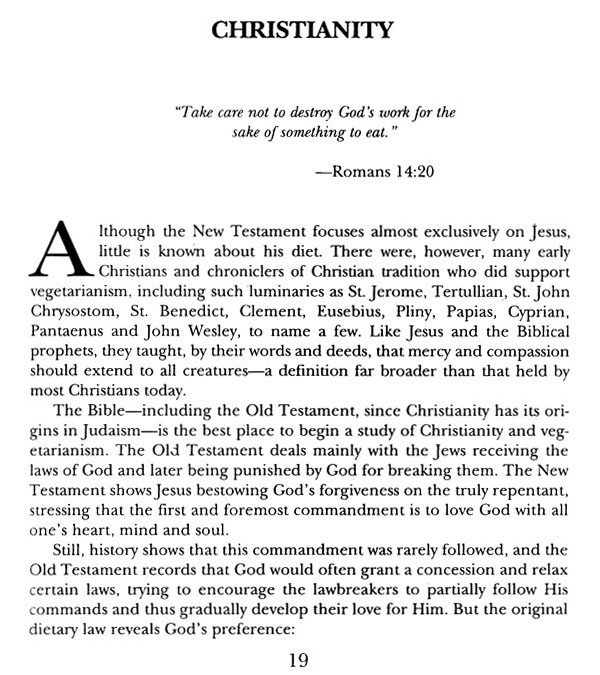
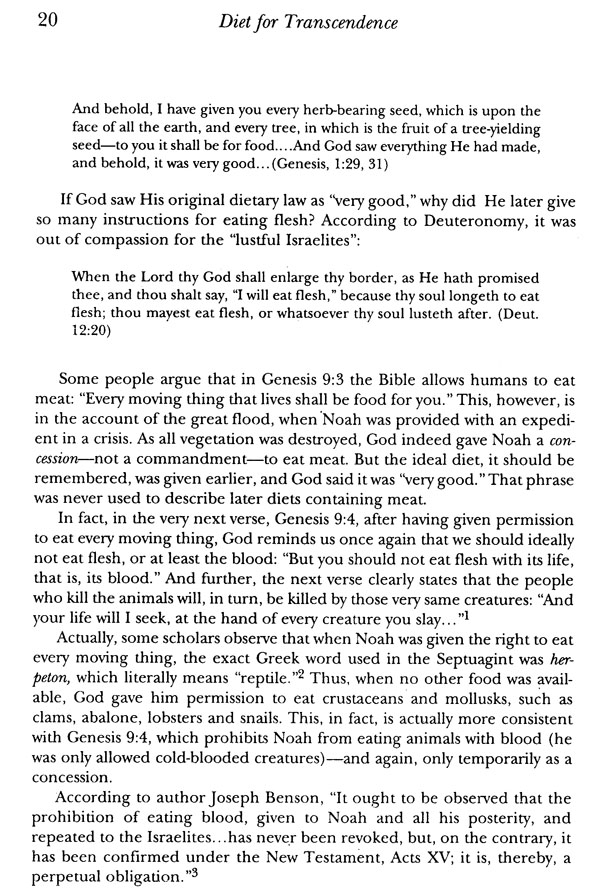

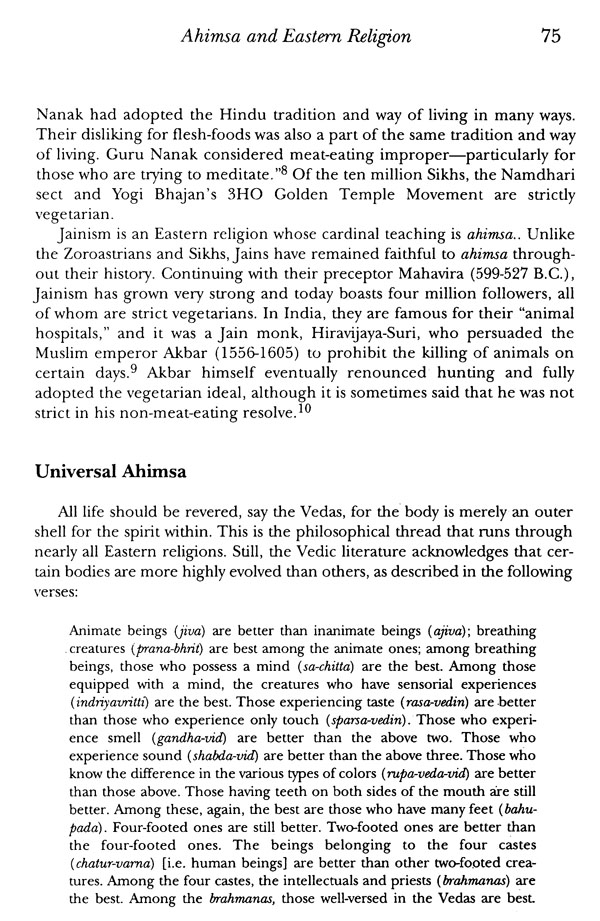
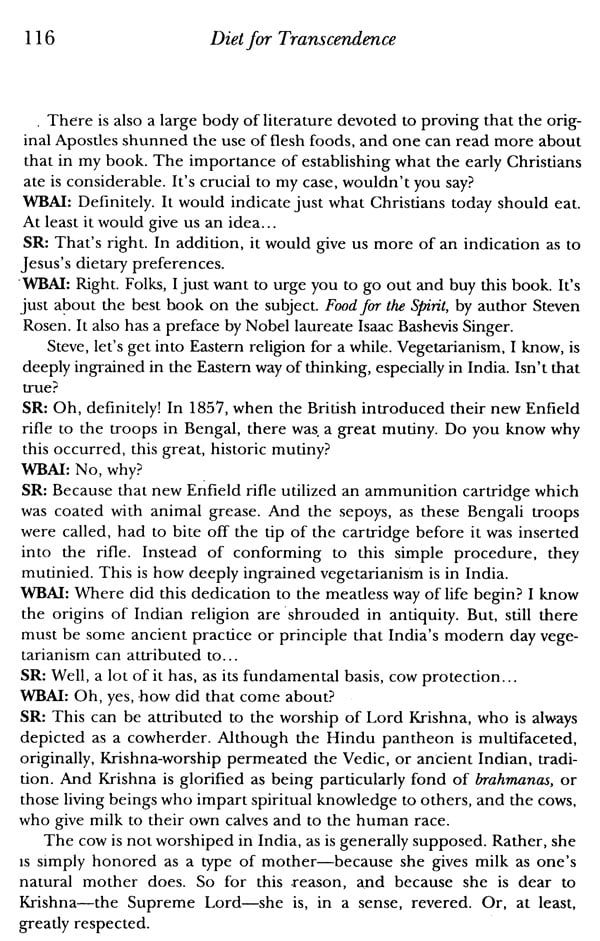
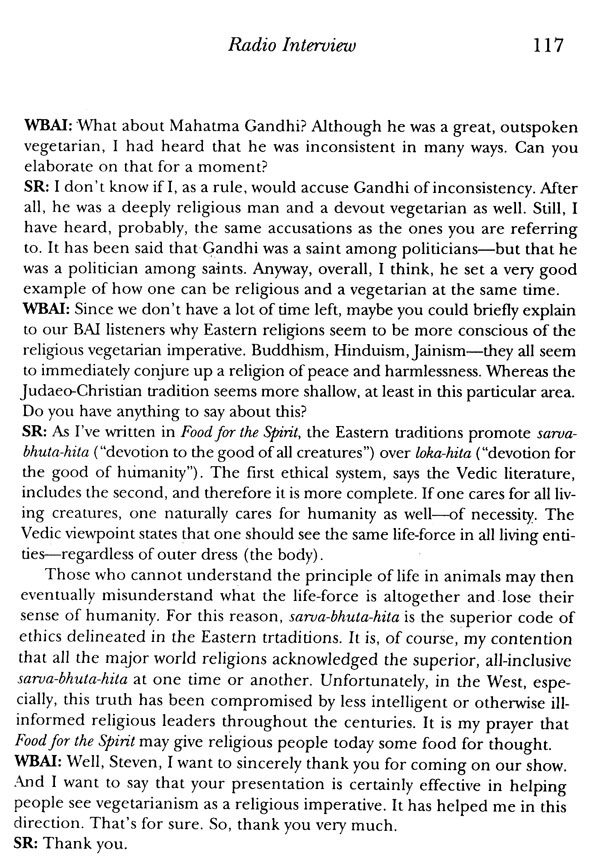
Delivery and Shipping Policy
- INTERNATIONAL SHIPPING
- Rs.1000-1100/kg
- ESTD. Delivery Time: 2-3 weeks (depending on location)
- Bubble Wrapped with Extra Padding
- NATIONAL SHIPPING
- NCR: Rs. 30/half kg
- Standard: Rs. 80/half kg
- Express shipments also available on Request
- ESTD. Delivery Time: Ranging from 1-4 days up to 7 business days (Depending on your choice of Delivery)
- TRACKING
- All orders; national or international, will be provided with a Tracking ID to check the status of their respective orders
- Depending on the Shipping Service, Tracking ID may be used on their respective tracking portals
Frequently Asked Questions (FAQs)
Domestic Shipping: 3-4 Days (after shipping)
International Shipping: 1-2 weeks (based on your location)
You will receive an email once your order has been shipped or you can email us if you didn't receive tracking details (info@mlbd.co.in)
Every book that we sell is the latest edition except all the rare books
Yes, we do provide free shipping, only on domestic orders (within India) above Rs.1500


